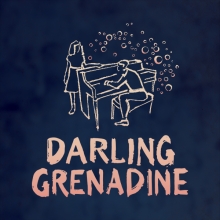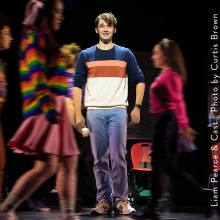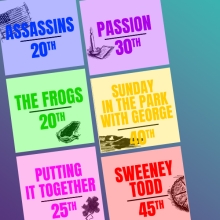
Full Synopsis
Act One
Lochran appears with a guitar in front of an oversized, war-torn American flag, circa 1862, and begins to sing ("Brother, My Brother"). Midway through, the flag flies away, revealing the company in tableau. In voiceover, we hear Lincoln speak, telling us that a nation divided against itself cannot stand and that the Union must defend itself.
Two brothers step out of the tableau. Sam and Nathaniel Taylor. Through the song ("A House Divided"), they disagree about which side of the argument to join and agree to go their separate ways, neither happy with the other. They step back into the tableau as Bill and Sarah step out, continuing to sing. Despite her protests, Bill tells Sarah that he must honor their forefathers by defending the country that they established. Captain Billy Pierce then steps out, claiming that he will defend Virginia, his land and home, against Union occupation. They all step back into the tableau, which is now a less-harmonious version of its former self.
The soldiers burst onstage, and the tableau is broken. Young recruits from both the North and the South shout war slogans and mock their opponents ("By the Sword / Sons of Dixie"). They boast of their strength and envision the glory that the battle will bring them.
The scene changes to a slave auction, where the Auctioneer sells off a young black man who stands, head bowed, following the Auctioneer's barked commands. The slaves sing of the ordeal of being sold as merchandise, separated from those whom they love, and of the terrible life that they endured on the plantations as we are shown projections of tortured slaves. Frederick Douglass prays "the Lord God send / all his wrath down upon what he knows isn't right" ("The Peculiar Institution"), and the slaves trickle away, the Auctioneer shouting, "Sold!" with each of their exits.
Again, the scene changes. Bill's wife, Sarah, writes a letter to him from their Minnesota farm. She tells him how she is learning to run the farm alone, but confesses that she is still "Missing You (My Bill)."
The captains of the opposing sides, Pierce and Lochran, confront their thoughts on the eve of battle ("Judgment Day"). They each pray, asking for God's mercy for sending men to their deaths in battle. As the sun rises, the battle begins and the brother, Nathaniel Taylor, is killed. Lochran and Pierce think of all of the letters that they have written to mothers whose sons have died in battle and the faces of all of the soldiers whom they have lost.
With the battle over and the dead taken to be buried, Pierce, a captain in the Confederate Army, sings of his homeland ("Virginia"). He dreams of the plantation of his youth and wonders if the way of life that he has known has gone forever.
Frederick Douglas steps forward and introduces himself. He says that, although others claim that the nature of the conflict is to preserve the Union, he believes that the abolition of slavery is the actual driving force behind the rebellion, asking if the political freedom discussed in the Declaration of Independence will be extended to Negros ("Freedom's Child").
Douglas exits, and a Union Captain steps forward for a montage from the front lines. He writes to his wife to tell her how the war has desensitized him to human casualty, just before a Union Soldier writes to his mother. He is near death on the battlefield and wants her to tell his father that he died as a man and with honor ("Tell My Father"). The Union Captain finishes his letter as a Confederate Captain and his soldiers step forward to confess that, although they'll probably die, they will proudly walk through heaven's doors in the Confederate uniform ("This Old Gray Coat").
Back in Minnesota, Sarah, Bill's wife, talks of the situation in the hospital where she is working as a nurse and of the young men whom she sees come and go ("I Never Knew His Name").
Frederick Douglas appears again, questioning how much longer "victories" in which 22,000 men are killed can go on. A gravedigger laments, wondering ("Father, How Long?") until he can sing freedom's song. Almost as if in answer, Harriet and the other slaves gather to sing about how they will soon be free ("Someday").
Act Two
In the darkness, we hear the haunting voices of soldiers singing ("Judgement Day – Reprise"). Rain appears on the scrim as the lights reveal the Confederates trudging forward through the winter ("How Many Devils"). Time passes on endlessly as they march. The exhausted soldiers wonder if the war that they thought would be so easy to win will ever come to an end. Winter turns into a blazing summer as the Union soldiers pick up the song. Their strength is ebbing and they dream of home, knowing all the while that they are likely never to return there.
A single soldier, a captain in the Confederate Army, studies the area. He realizes that he has never really looked at the countryside around him, the land that is his home. Even as he longs to linger, he knows that "I'll Never Pass This Way Again."
Elsewhere, Abraham Lincoln sits alone in the White House in the winter of 1862, candlelight beaming from his window. Harriet, a slave, wonders what he is thinking, comparing the light to the their hopes and dreams ("Candle in the Window").
The sound of artillery is heard. As time stands still, both a wounded Confederate soldier and a Union soldier sing the thoughts that run through their minds ("The Day the Sun Stood Still"). They describes the endless sea of soldiers that converges in a mass of blue and gray, beneath a sun that seemed to blaze for days on end.
Bessie, a slave, appears, writing a letter to her husband, who has been sold to another owner. She tells him that she is going to escape on the Underground Railroad, but that she will find him ("Prayin' – Reprise"). Benjamin, a recruiter for the Underground Railroad, enters and sings of getting slaves to freedom across the "River Jordan."
Bill writes a letter to Sarah from the battlefield. He tells her how much he loves and misses her, that every time he closes his eyes, he imagines memories with her and, even now, his heart is there ("Sarah"). Immediately after, she receives a black-bordered condolence telegram; Bill has died in battle. She vows that she will struggle on to raise their son and survive in the midst of tragedy for "The Honor of Your Name."
The two armies are exhausted, dispirited and numb; they seem to blend into one group, marching endlessly. A Union Captain pulls out a letter from his wife. He hangs on to the thought that only thirty days remain until he can return to her aboard a "Northbound Train."
Elsewhere, Confederate soldiers amass and discuss the fate of defeat that they know is coming their way ("Last Waltz for Dixie").
Gettysburg, Pennsylvania, July 2, 1863. The two armies are waiting for dawn to break on the second day of the battle as the sun rises on a wall of mist and the two armies face each other. The Union soldiers train their guns on the Confederate line, hidden by the fog. Lochran stands apart, calling on his soldiers to give their utmost for "The Glory." Pierce emerges with his men, knowing "the time to stand has come at last... / the bridge is burned, the dye is cast." The battle commences; fog and smoke cover the stage, revealing only battle flags and bayonets. When the fog dissipates, the stage is covered in fallen soldiers.
A woman appears looking for a loved one, whom she finds among the fallen. She cradles him and sings as others arrive, also looking for their loved ones.
Frederick Douglas enters and gives narration to the events that followed; the surrender of the Confederacy, Lincoln's second inauguration... and subsequent assassination. Eventually, Lincoln's own voice takes over as the soldiers rise to return to the tableau from which they all began.
Show History
Inspiration
Frank Wildhorn and Gregory Boyd had just put together the national tour of Jekyll & Hyde, and The Alley Theatre, which had premiered the show prior to its Broadway run, was preparing to celebrate its 50th Anniversary. The team wanted to create a new piece to commemorate the event; Jack Murphy signed on to collaborate, and The Civil War was created.
With this new project, the team wanted to create a nontraditional 'thematic' musical event, using a distinctively American voice with an emphasis on traditional storytelling. The Civil War is a musical event that borrows techniques from rock music, concert performance, oratorios and song cycles. The writers were inspired by the words of Walt Whitman, Frederick Douglass and Abraham Lincoln. They were also inspired by the life (as documented through letters, photographs and journals) of Hannah Ropes, Mary Chestnut, Second Virginia Infantryman Henry Kyd Douglas and Henry H. Pearson of the Sixth New Hampshire company.
Productions
Prior to any formal stage production, The Civil War received a star-studded concept album in 1995, featuring Hootie and the Blowfish, Blues Traveler, Travis Tritt, Betty Buckley and many others.
The Civil War premiered on Broadway on April 22, 1999, at the St. James Theatre. It closed on June 13, 1999, after 61 performances. Following its closing, the musical toured the United States, beginning in January of 2000 in Ohio. The Civil War was also one of the musicals produced at the newly-renovated Ford's Theatre in Washington, D.C. The production opened on March 27, 2009, and closed on May 24, 2009. Directed by Jeff Calhoun, the production was mounted as a reconceived staged concert.
Trivia
- In 2006, a new version of the musical opened at the Majestic Theatre in Gettysburg, Pennsylvania. Renamed as For the Glory: The Civil War Musical in Gettysburg, it featured a brand new story structure and two new musical numbers.
-
The Battle of Gettysburg claimed casualties of almost 51,000 lives, more than twenty times the population of the town of Gettysburg itself. The war would continue for two more years.
Critical Reaction
"A gloriously formal cantata composed in the vocabulary of popular music and performed with such joy and energy that it literally takes your breath away. ...An enthralling expression of both the best and the worst sides of the transcendent and enduring American character."
– Talkin' Broadway
"Timeless in its pursuit of universal truths... hauntingly effective... a variety of musical styles"
– Weekly Variety
"The method of The Civil War, in its lyrics and historical allusions as well as in its music, is to strike chords with which even an elementary school student would be familiar."
– The New York Times
Tony® Award
Drama Desk Award
Outer Critics Circle Award
Connect
Billing
- Book by
- Music by
- Lyrics by
Based on letters, diaries and writings of the Civil War
Requirements
| FRANK WILDHORN | GREGORY BOYD | JACK MURPHY |
Video Warning
In accordance with the Performance License, you MUST include the following warning in all programs and in a pre-show announcement:ANY VIDEO AND/OR AUDIO RECORDING OF THIS PRODUCTION IS STRICTLY PROHIBITED.
Included Materials
| Item | Quantity Included |
|---|---|
| LIBRETTO/VOCAL BOOK | 30 |
| PIANO CONDUCTOR'S SCORE | 2 |
| STUDY GUIDE | 1 |
Production Resources
| Resource |
|---|
| HOW DOES THE SHOW GO ON-10/CS |
| HOW DOES THE SHOW GO ON? |
| KEYBOARDTEK |
| LOGO PACK |
| LOGO PACK DIGITAL |
| PERFORMANCE ACCOMPANIMENT RECORDING |
| REFERENCE RECORDING |
| REHEARSAL ACCOMPANIMENT RECORDING |
| TRANSPOSITIONS-ON-DEMAND |
STANDARD ORCHESTRATION
| Instrumentation | Doubling |
|---|---|
| BASS | |
| DRUMS | |
| GUITAR | |
| GUITAR 2 | |
| KEYBOARD 1 | |
| KEYBOARD 2 | |
| VIOLIN |




